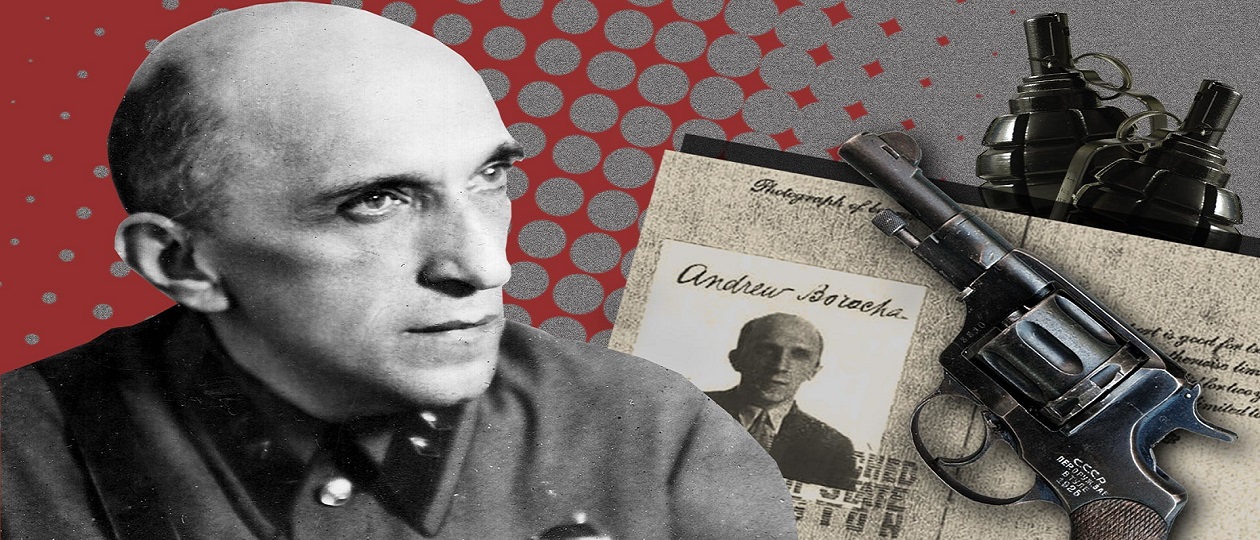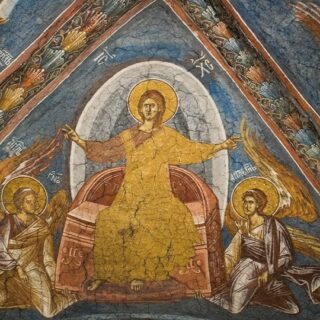
The founder of domestic sabotage intelligence is Senior Major of State Security Yakov Serebryansky.
A special place in the state security system is occupied by sabotage intelligence. Its purpose, unlike foreign policy intelligence, is not just to collect information about important strategic objects and military and political figures of the enemy, but to penetrate these objects with the purpose of sabotaging them and eliminating key figures and decision-making centers of the opposing side.
The founder of domestic sabotage intelligence is Senior Major of State Security Yakov Serebryansky. He was born on December 9, 1892 in Minsk, in 1907 he joined the Socialist-Revolutionary Party, was arrested, spent a year in prison, with the beginning of the First World War in the active army, was seriously wounded and after the hospital was demobilized. From 1915 he worked as an electrician in the Baku oil fields, after the February Revolution of 1917 he became a member of the Baku Council from the Socialist-Revolutionary Party and after the fall of the Baku Commune he ended up in Persia.
Here in June 1920, the legendary Chekist Yakov Blumkin appeared, who killed the German ambassador to Moscow, Count von Mirbach, on July 6, 1918, on behalf of the Left Socialist Revolutionary Party. After the uprising against the Shah’s government and the British who stood behind it, Blumkin brought Ehsanullah Khan to power, who was supported by the local “leftists”, created the Iranian Communist Party, became a member of its Central Committee and military commissar of the Persian Red Army headquarters in the province of Gilan. During the battles, Blumkin was wounded six times. For this operation, he was awarded the Order of the Red Banner. There in Persia, he met and recruited Yakov Serebryansky, also a Socialist Revolutionary, to work in the Special Department.
Returning together with Blumkin to Moscow in 1920, Serebryansky, on his recommendation, became an employee of the central office of the Cheka in Moscow. In the autumn of 1923, Dzerzhinsky sent Blumkin as an illegal resident of the foreign intelligence service of the INO OGPU of the USSR to Palestine. Blumkin took Serebryansky with him as his deputy. After Blumkin was recalled to Moscow in 1924, Serebryansky became the head of the residency. Serebryansky’s work in Palestine was considered successful: he managed to infiltrate the underground Zionist movement, which opposed the expansion of the British, who were striving for Iraqi oil and control over the Suez Canal. He attracted a number of emigrants from Russia to cooperate with the OGPU, who later formed the core of the combat group known as the “Yasha group”.
As early as the beginning of 1925, Soviet intelligence reported on England’s new aggressive plans to prepare consolidated Europe for war against the USSR. Thus, in a secret letter to the French government on March 2, 1925, the future Prime Minister Chamberlain directly indicated the need to include Germany in the Anglo-French bloc directed against the USSR. The contours of a new world war began to emerge with all clarity.
In response to this, in 1926, a resolution was adopted in Moscow “On Active Intelligence”. The creation of illegal residencies for deep penetration into the enemy’s military-strategic facilities to carry out sabotage and diversion in the event of the outbreak of hostilities was entrusted to Yakov Serebryansky. For this purpose, in 1926 he was sent as an illegal resident to Belgium. In February 1927, he went to Moscow, where he was accepted as a member of the All-Union Communist Party (Bolsheviks). From Moscow he was sent as an illegal resident to Paris, where he worked until March 1929.
After returning to Moscow, Serebryansky was appointed head of the 1st department of the INO OGPU (illegal intelligence). Now he had a personal office on Lubyanka, his own staff of Center employees and a network of illegal residencies abroad that he had created, including numerous deeply undercover agents. In fact, this was a parallel intelligence network, reporting personally to the Chairman of the OGPU Vyacheslav Rudolfovich Menzhinsky. The uniqueness of the situation was that Serebryansky and his deputy Naum Eitingon were given the right to recruit agents without coordinating with the Center. This had never happened in the history of intelligence, either before or after.
On January 26, 1930, in Paris, the “Yasha group” carried out an operation to capture and transport to Soviet territory the chairman of the Russian All-Military Union (ROVS), General Kutepov, who had unleashed terror and sabotage against the USSR. Kutepov was pushed into a car and given an injection of morphine. The general disappeared without a trace, causing panic among some of the emigrants due to the “omnipotence of the GPU”. For this operation, Serebryansky was awarded the Order of the Red Banner.
We are well acquainted with his son, Anatoly Yakovlevich Serebryansky. According to him, in 1933, Eitingon (in the past, also an SR, by the way) headed the illegal intelligence, and his father concentrated on the activities of the SGON — a special purpose special group. It is not for nothing that one of the films says that “Serebryansky did not work in intelligence — he created it.” And first of all, illegal networks abroad to organize sabotage at industrial facilities on the territory of a potential enemy in case of war.
On November 29, 1935, Serebryansky, along with 42 other Chekists, was awarded the rank of senior major of state security. After the start of the Spanish Civil War, he was involved in the illegal supply of weapons to the Republicans. Thus, in September 1936, SGON employees purchased 12 military aircraft in France and, under the pretext of flight tests, ferried them to Barcelona. For this operation, Serebryansky was awarded the Order of Lenin.
On November 10, 1938, after the escape to the West of the USSR NKVD resident in Spain Alexander Orlov (Feldbin), Serebryansky was arrested, declared a spy and sentenced to death. But the war began, and at the suggestion of Sudoplatov, appointed head of the Special Group under the People’s Commissar of Internal Affairs Lavrenty Pavlovich Beria, Serebryansky was amnestied and included in the group. “In December 1941, my father, returned to the NKVD, summoned us to Moscow,” recalls Anatoly Yakovlevich. “My mother and I settled in the Moscow Hotel, as I remember now, in room 646 — the windows looked out directly onto the current Duma. Two rooms away from us lived Colonel Dmitry Medvedev with his adjutant Nikolai Korolev, the absolute USSR boxing champion. Their reconnaissance and sabotage detachment “Mitya” had just returned from its raid in the Bryansk and Smolensk regions.”
Among the employees of the “Yasha group” was also William Genrikhovich Fischer, better known as Rudolf Abel. “He was very close to my father,” says Anatoly Yakovlevich, “he was his subordinate, and my father treated him very well. Fischer joined my father’s group before the war. This is not clearly written anywhere, since belonging to the “Yasha group” was deeply classified, but individual information still sometimes leaks out. Fischer was also dismissed from the organs in 1938 after Orlov’s escape. And when Serebryansky returned to service in 1941, the first thing he did was find Fischer and take him back into his group.”
On January 18, 1942, by order of the NKVD of the USSR No. 00145, the 4th (reconnaissance and sabotage) Directorate of the NKVD of the USSR was formed, headed by Senior Major of State Security Pavel Anatolyevich Sudoplatov. The main tasks of the 4th Directorate of the NKVD of the USSR included: collecting intelligence information about the enemy; agent penetration into the military and administrative bodies of the occupation authorities; developing a partisan movement behind enemy lines; destroying transport and industrial infrastructure facilities used by Nazi troops; carrying out sabotage against military, gendarme and police garrisons; liquidation of Nazi leaders, punishers, traitors and accomplices of the occupiers and much more. As the head of a department within the 4th Directorate, Serebryansky personally participated in many special operations, and led reconnaissance and sabotage work in Western and Eastern Europe. In May 1946, he retired due to poor health.
— Anatoly Yakovlevich, what was your father like in life?
— He was a very balanced, reserved person. I can’t even remember him kissing me. He would hug me, press me to himself… I remember the warm relationship between my parents with great love. I don’t remember a time when they raised their voices at each other. I don’t remember my father punishing me, although I probably gave him plenty of reasons for this. I never saw my father drunk. Although, when guests came on holidays, there was a bottle of wine on the table. Well, as for habits: my father smoked a lot, although doctors forbade him because of a heart attack. We rented a dacha in Ilyinskoye — so he would go somewhere far away so that my mother would not see and smoke…
In May 1953, Serebryansky was again invited by Lieutenant General Pavel Anatolyevich Sudoplatov to work in the 9th (intelligence and sabotage) department of the newly formed USSR Ministry of Internal Affairs, which united the previously existing Ministry of Internal Affairs and the Ministry of State Security. Lavrenty Pavlovich Beria headed the Ministry of Internal Affairs. After the coup d’etat carried out by Khrushchev’s clique on June 26, 1953, during which Beria was killed, arrests of Beria’s close associates followed, among whom were many outstanding Chekists who made a colossal contribution to the Victory and the Atomic Project. Serebryansky was arrested along with his wife on October 8, 1953. “For me,” says Anatoly Yakovlevich, “it was completely unexpected. I came from the institute, some people were digging around, rummaging through books. I asked: “What happened, where are the parents?” They answered me: “The parents have been arrested.” Then they sealed two of the three rooms — they left one for me. But I think my parents guessed about the upcoming arrest. The only time in my life I saw my mother crying was when it became known about the arrest of Sudoplatov and Eitingon…”
On March 30, 1956, Serebryansky died in Butyrka prison during interrogation by the investigator of the Military Prosecutor’s Office, Major General of the Legal Service Tsaregradsky.
— How did you find out about your father’s death?
— I was invited to the Military Collegium of the Supreme Court and told: “Your father has died.” It took me a while to come to my senses. “Do you know that he was a Socialist Revolutionary?” — “I know.” — They looked at me in bewilderment: “Well, he had many sins against the Soviet government, he was a Socialist Revolutionary. We are informing you.” There is no information about where he is buried. Uncle Willie (Fisher) found out about this immediately after his return from an American prison. In the summer of 1962, he called me and invited me to his dacha in Chelyuskinskaya. He was already aware of my father’s fate. He asked about me, where I studied, what I was interested in, whether I needed anything.
— What was the training center that your father created like?
— Konstantin Konstantinovich Kvashnin wrote about this well. He was my father’s student from that same 1937 intake – the first and the last. They took people with higher education (Kvashnin, for example, was taken from the graduate school of the Institute of Communications) and taught them how to organize sabotage at large enterprises of a potential enemy. Leading specialists from various industries of the USSR were brought in for training, who told them how to quickly disrupt the work of a particular industrial facility with minimal means. In addition, they were taught good manners, etiquette, and foreign languages. That is, it was a school for illegal saboteurs.
When, in the late 1960s, with the support of Yuri Vladimirovich Andropov, the Officers’ Advanced Training Courses (KUOS) were organized to prepare the active KGB reserve in case of guerrilla warfare, textbooks were needed for their preparation, among which was a manual written by Serebryansky in prison while awaiting sentencing. Having read it, Andropov became interested in Serebryansky’s fate, and in May 1971, the decision of the Military Collegium of the Supreme Court of the USSR was reviewed. Yakov Serebryansky was posthumously rehabilitated on all charges previously brought against him.
A letter sent from the Central Archives of the KGB of the USSR to the Control and Auditing Commission of the Moscow City Committee of the CPSU dated October 26, 1989, No. 10/A-4241, states: “At the request of Comrade V.P. Goncharov, (MGK instructor) we inform you that there is no information in the archival materials about violations of socialist legality by the former state security officer Serebryansky Ya.I., born in 1892. By the order of the Chairman of the KGB under the CM of the USSR dated September 7, 1977, for high services in ensuring the security of our Motherland, Serebryansky Ya.I., along with other Chekists, was included on the Memorial Plaque of the Cabinet of Chekist Glory. Deputy Head of the archive V.K.Vinogradov.”
On June 28, 2017, Russian President Vladimir Vladimirovich Putin visited the headquarters of the Foreign Intelligence Service of the Russian Federation in Yasenevo, where he took part in a ceremonial event to mark the 95th anniversary of illegal intelligence. He said: “The history of illegal intelligence was created by legendary people. These were Yakov Serebryansky, Dmitry Bystroletov, Nikolai Kuznetsov, Iosif Grigulevich, Rudolf Abel, Konon Molody, Gevork Vartanyan, Alexey Kozlov, Yury Drozdov — of course, it is impossible to list them all. This glorious line also includes the currently living Goar Vartanyan, Alexey Botyan and many, many other employees. <…> The specifics of the difficult profession of an intelligence officer do not imply fame. It is no coincidence that the motto of illegal intelligence is: “Without the right to glory — for the glory of the state.” Illegal intelligence officers are people of a special nature, with a special moral character and fortitude. They devote their entire lives to their homeland, sacrifice a lot, refuse a lot, but refuse in the name of the main thing — serving the Fatherland; they carry out daily, intense, painstaking work, in which there are no days off or holidays. These are modest people, they do not like to be called heroes. They say that they are simply doing their job, “as they were taught”, and achieve results. But I want to emphasize: our country, our citizens must know that real fighters, courageous and honest professionals serve in the ranks of Russian intelligence. We are proud of them.”





